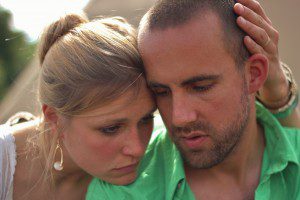
For most parents, the thought that strikes fear in our hearts like no other is losing a child. No parent wants to outlive their children, and whether that child is unborn, an infant, a child, a teenager, or an adult, they are still our babies. The thought of saying an early good-bye is heart-wrenching.
When the unthinkable happens to a friend or family member, we often feel lost. Whether the loss is from difficulties in pregnancy, or cancer, or an accident, we want to make it better … but feel helpless because we can’t turn back time, or speak health and life into what happened.
Here are some things you can do to help someone you love who is walking the road of loss:
Understanding
First, some background information to prepare you for the road:
- You can’t make it better, but you can help to not make it worse.
- Your loved one will never get back to normal. They will find a new normal, but the path to that point is different for each person. You can support them while they find it, but you can’t find it for them.
- Men and women grieve differently. But that doesn’t mean that men don’t grieve. For some more ideas on what men need from the women in their lives when they are grieving, look here.
- Your friend may bow out of social events with no warning. Baby showers, graduations, movies with a certain scene, family gatherings – there are all kinds of triggers for grieving parents. Let them bow out graciously.
- Everyone grieves in their own way. There are no rules, as long as they are not hurting themselves or someone else. Don’t expect them to stick to a certain schedule or way to grieving.
- This is not about you. It is about your friend. There is some great, practical advice in this article. Read it.
- Your role as a friend is to comfort, not to fix.
Words
We always want to know what to say and what not to say. Remember, your goal is to comfort, not to fix. Also, remember that words can be true without being comforting. With that in mind, here are some brief lists to tuck away in your memory:
Words that hurt:
- “At least…” Anything that begins this way seeks to minimize legitimate feelings of loss and sadness because a) it could be worse, or b) someone else has had it worse. Your friend needs to have his or her grief recognized, not minimized.
- “Everything happens for a reason.” In the worst moments of grief, no reason will ever make a parent content with the loss of their child. None. Don’t go there, whatever your personal beliefs are about this.
- “He’s in a better place.” I believe this, I do. But when I lost my daughter Naomi, I didn’t care, because I wanted my baby back. I found great comfort in the words of C.S. Lewis, in his book A Grief Observed. He explains it this way: “If a mother is mourning not for what she has lost but for what her dead child has lost, it is a comfort to believe that the child has not lost the end for which it was created…A comfort to the God-aimed, eternal spirit within her. But not to her motherhood. The specifically maternal happiness must be written off. Never, in any place or time, will she have her son on her knees, or bathe him, or tell him a story, or plan for his future, or see her grandchild.” Don’t brush away your friend’s grief, even with the glories of Heaven.
- “Let me tell you about…” Followed with a story of someone else who had it worse. That doesn’t help.
- “I know how you feel.” Unless you have also lost a child, you don’t know how it feels. And even if you have, you don’t know how this loss feels to your friend.
Words that heal:
Keep it simple and heartfelt.
- “I’m sorry.”
- “I wish you weren’t going through this.”
- “I don’t know what to say, but I am here.”
- “I’ve also….would you like to get together sometime to talk?”
- “I’m praying for you.”
Actions
- Weep. The Bible has apt advice – “weep with those who weep” (Romans 12:15, ESV). There is great comfort in crying together.
- Listen. Listen more than you talk. Ask questions, especially about the memories your friend has of his or her child. Let them talk. Or let them be silent, and then be content to be silent with them.
- Remember. Write the date of your friend’s loss on your calendar for next year, along with a reminder to call them or send them a card in the months or weeks leading up to it. Do the same on the child’s birthday, your friend’s birthday, the major holidays, and Mother’s Day and Father’s Day. Then do it again the next year, when most people will have forgotten.
- Help with the mundane. Meals, laundry, yard work (remember, dads grieve, too). Help with the unexpected costs of a funeral. Offer rides to take surviving children to activities. Don’t ask a grieving parent to call when they need you. They are in survival mode and have no idea what they need. Instead say, “I would like to ______. Would that be okay/would that help?”
One of the tragedies that often accompanies the loss of a child is when the parents also experience the loss of friends who shy away because they don’t know how to come alongside them in their time of tragedy. Don’t be that friend. Instead, be the one who sticks around, who remembers the anniversaries and the hard days, who listens to your friend when they share again how special their child was and what they miss the most, the one who sees them through to the other side of the storm.
Resources
- Sunshine after the Storm – a guide to navigating the road of pregnancy and infant loss, written by men and women who have been there (contributions from Columbia SC Moms Blog writers Kristi Bothur and Alexa Bigwarfe, who also edited it)
- Mommies with Hope – a website for parents grieving the loss of a baby
- “Dear Mom of a Baby in Heaven” – a letter to newly grieving parents from Naomi’s Circle founder Kristi Bothur
- Naomi’s Circle – Columbia-based ministry for parents dealing with the loss of a baby in pregnancy or infancy; includes a list of local support groups in the Midlands
- “Helping a Friend” – a more thorough list of what to do and not do when your friend is going through pregnancy or infant loss, but applicable to losses of children at all ages
- Joy in the Mourning Center for Life Losses – a local organization with the mission of providing programs and people to help individuals and families cope with the different losses of life and return to the joy of living.
- Compassionate Friends – for parents dealing with the loss of a child
- Griefshare – a network of support groups and seminars for walking alongside those going through grief; there are several in the Columbia area
Have you dealt with a loss? What was helpful to you?














There is also another group called Home Mommies (http://hopemommies.org). They have these amazing Hope Boxes that you can order and have sent to them when it first happens. I have had two friends, unfortunately, in the last year lose children and they have both said receiving these boxes was such a blessing. This organization also has retreats and online support for moms.
Thank you for sharing
Thank you for sharing. Even though I have personal experience with pregnancy loss (3 total), I still find it difficult to know what to say to others……I have taken your words to heart.
Kimberly, thank you for your response. I am so sorry for your losses. If you would like to connect with other moms in our area who have lost babies during pregnancy, I would be happy to help. In fact, our next meeting is this coming Thursday. Contact me at [email protected].
Thank you Kristi. This is a beautiful post!
Hello,
I recently lost my 43 day old baby boy to congential heart disease. It was the most painful thing I have ever felt. To bury your own child and to see him going away from you forever, it’s hard. I deal with all my sadness inside me. I never show my emotions not even on social media. People think I’m strong but I am the weekest person inside. I lost a lot of my friends after my loss. Even the closest friend to me, that person didn’t even come to the funeral. No body talks to me about my loss and I don’t even care if they talk or not bec my child didn’t mean anything to anyone and no one cares about how I feel. Maybe I gained some family but not to many. All they think about if the conversation opens is this is awkward.
Hager, I am so terribly sorry for the loss of your son. I understand that hurt. The day I buried my daughter was the most painful of my life, next to the day that she died. Please feel free to contact me at Naomi’s Circle [naomiscircle (at) gmail (dot) com] if you would like to connect with other parents who have walked this road and who do understand and do care. I hate to see you dealing with this alone.
I lost my son at 9 days, from a fungus infection. He also had CHD.
It’s been 5 1/2 years since I lost my son in an accident. Also I have learned to keep moving forward, the hurt is never far behind. People assume because you are carrying on, you are ok. It’s never ok.
I lost my daughter Lorraine in 1971 she was 3.5 months old. She died as a result of a cot death. My other daughter Yvonne died in a car crash when she was twenty year old in 1989. It has been devastating for me and my family over the years. Sadly me and my wife divorced. They were our only two children. You have no idea the pain you go through every day. Heartbroken is an understatement. Tony from Scotland.
I just say your site in my fb feed. I lost my daughter. Here is a link to a page I built for her. If you like it feel free to share. It took about 14 years for the strength to write it.
https://m.facebook.com/thelossofjessica
Parents Left Behind has been helpful to me. My son died June 2014.
http://www.parentsleftbehind.com
I lost my 23 year old son 11 months ago today. I feel as if I am walking alone on a one lane road that does not have an end in site and there is no anyone walking with me. I read what Hager said about the loss of friends, the feeling of being weak and feeling alone and it’s as if those words came out of my mouth too. I have a hard time leaving my house to do anything as well as not doing much inside too which brings me to the heavy guilt I put on myself for not keeping up with my responsibilities within my family. I am so thankful every day for my husband and our 2 younger children (9 and 10) but somehow this doesn’t make “walking this one lane road alone” any easier at all. I don’t want to be the person I have become and I can’t remember the person that I once was. Learning how to smile through the tears seems an impossible feat but we all must somehow find the courage to try.